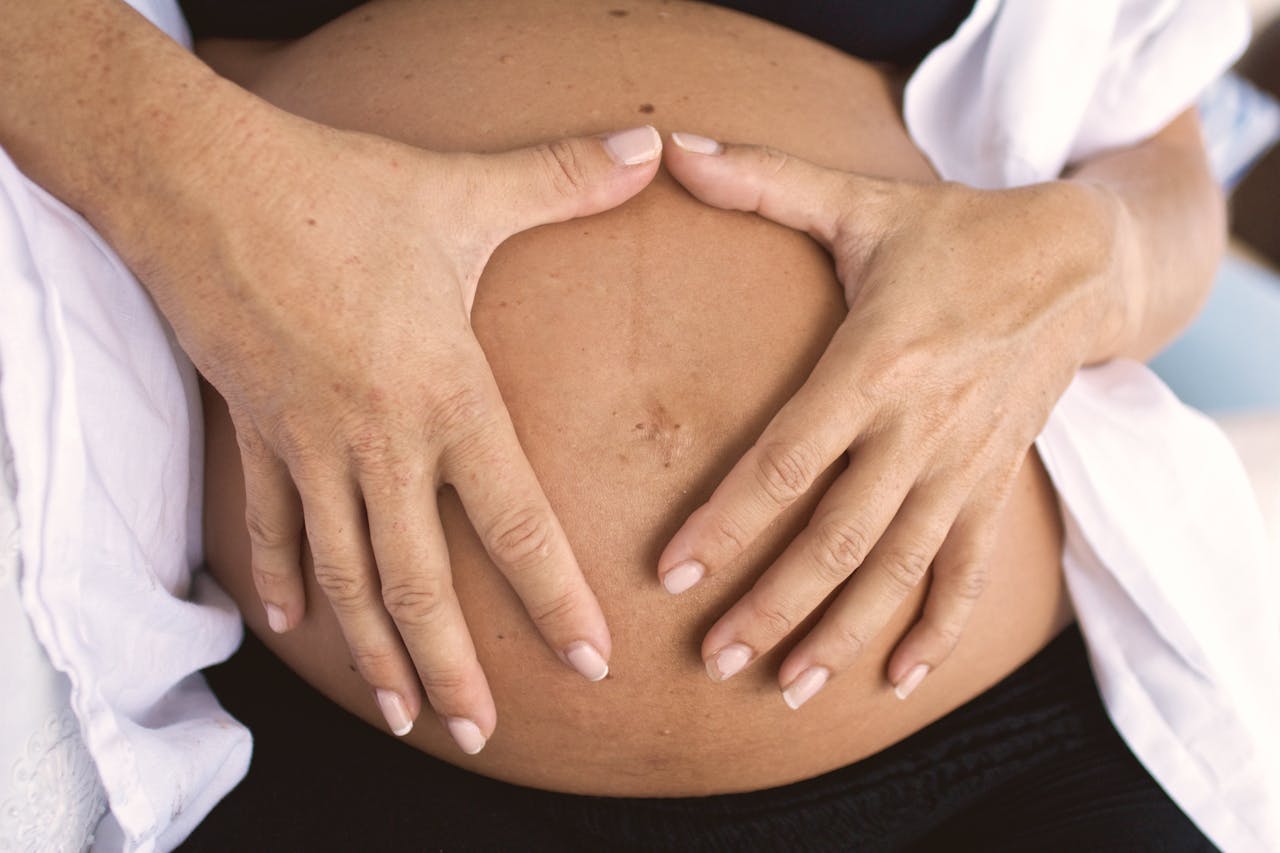Does progesterone increase libido? Understanding the link

Does progesterone increase libido? In this article, you'll learn about the complex link between a hormonal balance and your sexual desire.
Libido stands for sexual desire. It plays an important role in your sexual life, intimacy, emotional well-being, and physical health. When it’s low, it can cause excessive stress, relationship problems, anxiety, and potentially underlying health issues. To prevent this, it’s important to keep an eye on your drive and support it through hormonal balance.
Your sexual drive is affected by the three primary reproductive hormones – estrogen, progesterone, and androgens. Estrogen is known to increase sexual activity. But does progesterone increase libido? Although its high levels naturally suppress the drive (such as during the luteal phase), low progesterone and estrogen dominance can also lead to a low libido. In this case, increasing progesterone levels to balance out estrogen can help support a healthy libido.
Libido is the foundation of your sexuality. It urges you to seek intimacy, maintain close relationships, and have sex. On top of that, it plays an important role in your overall mental and physical health. Naturally, when it’s low, you may start seeking the cause of the problem and possible solutions.
While it’s generally well-understood that there is a link between your reproductive hormones and libido, there are still many concerns regarding which hormones affect the drive in a positive and negative way. In this guide, we’ll address one of such concerns and answer the question – Does progesterone increase libido?
{{button}}
Libido: The Definition and Role in Female Life
Libido is a term used to define sexual desire. Clearly, it plays a massive role in one’s sexual life by defining the level of arousal and the quality of sex. However, it goes far beyond sex. In reality, libido is also responsible for intimacy in relationships, good emotional health, and overall quality of life. It’s especially important for women. According to the Oregon Health & Science University, a healthy sex life provides the following benefits for women:
- Lowered blood pressure
- Heart health support
- Improved immune system
- Stress reduction
- Reduced anxiety and depression
- Pain relief
- Improved self-esteem
- Better sleep
All these benefits are crucial for a healthy and happy life. Nevertheless, receiving them is nearly impossible when there is no libido because when there is no drive, you may not be able to sustain close relationships, have sex, and receive pleasure. That’s why keeping an eye on your libido and knowing how to improve it is important.
Understanding Low Libido and Its Causes
If libido stands for sexual desire, low libido is a condition in which you have a low sex drive. It can manifest through less frequent thoughts about sex and a lack of interest in any form of sexual activity, including masturbation.
In females, it can be caused by natural reasons, such as perimenopause, menopause, pregnancy, childbirth, or breastfeeding. Additionally, it can be a result of other factors like:
- Birth control
- Sexual problems, for example, vaginal dryness or pain
- Infections
- Problems in relationships
- Mental health challenges
- Past sexual trauma
- Fatigue
- Reproductive health conditions, such as PCOS or endometriosis
- Other health conditions, including diabetes, heart disease, underactive thyroid, etc.
The Link Between Hormones and Sex Drive
Although there might be external factors leading to low libido, hormones play the primary role in activating and maintaining your sexual desire. In particular, libido is linked to your gonadal hormones. In females, there are three of them – estrogen, progesterone, and androgens (male hormones). Fluctuations in these hormones through the cycle can create changes in the drive, increasing and lowering it.
Does Progesterone Increase Libido?
As you already know, low libido can influence different areas of your life, beyond the bedroom. Thus, if you are having certain challenges with feeling the drive or finding interest in sex, it’s natural to start looking for solutions. And, since hormones play a massive role in the mechanism of desire, many women wonder – does progesterone increase sex drive? Let’s figure it out!
Progesterone is one of the main reproductive hormones in females. It’s produced in the ovaries after ovulation. The primary function of this hormone is to prepare your body for pregnancy by thickening the uterine lining. Apart from this, progesterone is responsible for maintaining early pregnancy, regulating your menstrual cycle, preventing ovulation during pregnancy, and preparing breasts for lactation.
So, does progesterone increase libido? Traditionally, it’s believed that estrogen is the primary hormone responsible for female libido. This fact is confirmed by studies on post-menopausal women, which have shown improvements in their sex drive thanks to estrogen-only therapy. However, your libido is not about estrogen alone. Progesterone is a hormone that balances estrogen levels. Thus, its effects are often somewhat opposite to those of estrogen.
Does progesterone lower libido then? Technically, yes. Your estrogen levels are high in the first part of the menstrual cycle, prior to ovulation. They increase to stimulate sexual desire for future reproduction. After ovulation, however, estrogen levels drop drastically. And although estrogen starts rising again several days after ovulation, progesterone rises as well, and many women notice a decrease in their sexual drive during this time. Biology explains it by a lack of reproductive advantage to have sex during this part of your cycle because the luteal phase is all about implanting a fertilized egg and supporting pregnancy.
When Does Progesterone Help Libido?
As discussed earlier, progesterone does not increase libido on its own. It’s estrogen that stimulates desire, whereas progesterone, on the contrary, suppresses it during the luteal phase. Still, it’s important to mention that your libido needs a balance. That is, there are occasions when progesterone does help your drive.
How’s that? While high levels of progesterone (such as during the luteal phase) can lower desire, low levels of this hormone can also cause negative changes in libido. When your progesterone is below normal, this can lead to estrogen dominance and create a significant hormonal imbalance.
This can come with a variety of unpleasant symptoms, including:
- Breast swelling and tenderness
- Menstrual irregularity
- Heavy periods
- More prominent PMS symptoms
- Insomnia
- Mood swings
- Decreased sex drive
Ultimately, the most important takeaway from this is that a harmonious balance of estrogen and progesterone is the key to a healthy libido.
FAQ
Does progesterone lower libido?
Progesterone is the dominant hormone in your luteal phase. This phase is the second part of your menstrual cycle that begins after ovulation and lasts until your periods start. During this period, your body strives to move a fertilized egg down your fallopian tube and thicken the uterine lining (the primary function of progesterone) to allow implantation. As your body prepares for a possible pregnancy, there is no reproductive advantage to having sex during this time. So, yes, high progesterone is shown to suppress libido.
When does progesterone increase libido?
In general, estrogen is the primary hormone responsible for sensuality and sex drive. However, it needs progesterone to balance it and help you maintain a healthy libido. That is, when your progesterone is low and you have estrogen dominance, it can also decrease your drive. In this case, progesterone supplementation can help you regain balance and increase libido.
Conclusion
So, does progesterone make you hornier? As you now know, the role of progesterone is to prepare you for pregnancy. When this hormone gets to work, in your luteal phase, your libido may naturally decrease as the core goal of your body during this time is to prepare the uterus and implant a fertilized egg. These facts suggest that high progesterone suppresses libido rather than helps it.
On the other hand, a healthy libido requires a good hormonal balance. When your progesterone is low and you develop estrogen dominance, this can also lead to a lowered libido. Thus, the key to supporting your sexual life is to maintain the proper balance between these two hormones.
{{pink-banner}}




.jpg)
.jpg)


.avif)
